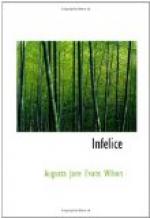“Well, somebody must do it; but, like you, I am not brave enough to meet her with the tidings. When it is necessary, I can amputate limbs, and do a great many apparently cruel things, but when it conies to breaking such bad news as this I am a nervous coward. Mr. Campbell is a kind, tenderhearted friend of the family, and I will request him to take a carriage and meet her to-morrow. Poor thing! what a welcome home!”
Soon after he left her she heard the whistle of the night express, which arrived simultaneously with the departure of the outward train bound south, and she knew that it was eleven o’clock.
Hannah was in the kitchen talking with Esau the sexton, and when several gentlemen who offered to remain until morning came out on the verandah, leaving the blinds of the library windows wide open, Regina rose and stole away to escape their observation.
Although walking swiftly she caught sight of the table in the middle of the room and of a mass of white drapery, on which the lamp-light fell with ghostly lustre. Twelve hours before she had sat there, reading to the faithful kind friend whose affectionate gaze rested all the while upon her; now stiff and icy he was sleeping his last sleep in the same spot, and his soul? Safely resting, after the feverish toil and strife of Time, amid the palms of Eternal Peace. Not the peace of Nirwana; neither the absolute absorption of one school of philosophy, nor the total extinction inculcated by a yet grosser system. Not the vague insensate peace of Pantheism, but the spiritual rest of a heaven of reunion and of recognition promised by Jesus Christ our Lord, who, conquering death in that lonely rock-hewn Judaean tomb, won immortal identity for human souls. Not the succession of progressive changes that constitute the hereafter of—
“This
age that blots out life with question-marks,
This nineteenth
century with its knife and glass
That make
thought physical, and thrust far off
The heaven,
so neighbourly with man of old,
To voids
sparse-sown with alienated stars.”
Among the multitudinous philosophic, psychologic, biologic systems that have waxed and waned, dazzled and deluded, from the first utterances of Gotama, to the very latest of the advanced Evolutionists, is there any other than the Christian solution of the triple-headed riddle—Whence? Wherefore? Whither?—that will deliver us from the devouring Sphinx Despair, or yield us even shadowy consolation when the pinions of gentle yet inexorable death poise over our household darling, and we stand beside the cold silent clay, which natural affection and life-long companionship render so inexpressibly precious?




